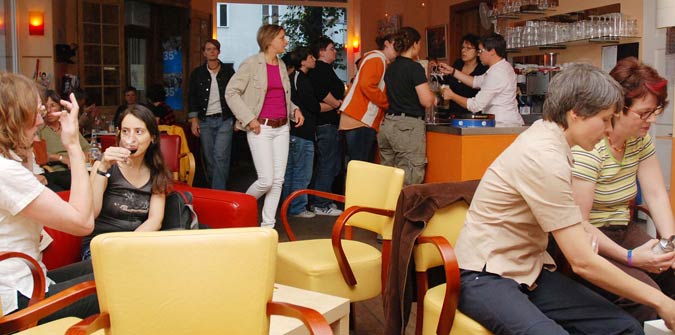Too good, because it's independent. Within European Commission’s Erasmus+ program I was a volunteer trainee at Sonntags-Club Women*’s section last year. During that time I learnt a lot about how life is at a German LGBTQ+ organisation and what it is like to live and work in Berlin.
Before anyone would think the following lines will be about how everything is better in Western Europe or that the ones whose work is also their hobby are the happiest of all, I’m telling you that this article is just a subjective coverage. Most of all it is about Sonntags-Club: an LGBTQ+ organisation in Berlin with a 40+ year history that gave me the most I could have received being a volunteer.
What is Sonntags-Club?
A unique place in Berlin, not just because of its long history, but because it gives place to a lot of things an LGBTQ+ person needs. Besides a café opening 6 p.m. every day it offers psycho-social counseling during the day, and in the café you can bump into self-organised group meetings to which you can join at any time. On the weekend there are workshops, trainings, concerts and presentations, and Fridays are for women* only. This is the day that only women can enter the Club and also when women groups meet up: the organising group, the Handwerkerinnen (the group of craftswomen) and the group of women working in healthcare. Otherwise the place is straight-friendly and takes into consideration the demands of the neighbourhood as well.

Sonntags-Club is one of the official Berlin antidiscrimination locations: besides supporting each other and LGBTQ+ visibility the organisers’ goal is that acceptance should come natural to everyone. The Club ensures its existence by receiving some (minimal) state funds, with 3 full time employees and more than 50 volunteers.
A little history and the name
44 years ago in German Democratic Republic (!) a Society called Homosexual Community of Interest Berlin was founded, with an unquestionable justification: homosexual emancipation is part of the successful socialism, whether the people in power are aware of it or not. The Society wrote its official code as Sonntags-Club on 10th November 1989 (the day after the Wall came down), and since then the information and counseling centre and café has been a special spot in Berlin’s LGBTQ+ life. The name has been used since the 80’s as the easiest day to find an empty place for the events was on Sunday, and also it was neutral enough to be a good code word to book a place at that time.
What have I gained from Sonntags-Club?
First of all, I have to tell you that that the preparation for the numerous programs demands a continuous work from the organisers, but above that, networking on local and national level, supporting works and presenting ourselves at events outside the Club are also part of the job. Getting to know the daily work of the nonprofit organisation, participating in the organising and planning office work, later leading my own antidiscrimination project gave new meaning to my sociology degree. I had a chance to dive into my interests in feminism, gender and LGBTQ+ equality both in academic and in civil environment: I would listen to university lecturers, speak with social workers and activists. I attended trainings, conferences, took part in cooperations with other organisations. For instance, celebrating the legalization of same-sex marriage at Bundestag Rainbow Night was a truly unique experience.

Besides occasional events, Berlin’s permanent LGBTQ+ programs are also various. However, for me, going to Schwules Museum’s exhibitions and talks together with attending FLTI nights (Frauen Lesben Trans* Inter = Women, Lesbians, Trans and Intersex people) of some pubs, spending time at Sonntags-Club was just enough. The work environment free from sexist jokes and offensive heteronormative questions, the group of friends and the safety I discovered and felt at the Club let me forget in no time that I used to live without these experiences.
Berlin vs Budapest (no)
I don’t compare Berlin and Budapest intentionally, because it would only be justified if we took what they sometimes say seriously: that “Budapest is the little Berlin” or “Budapest is like Berlin 15 years ago”. This would mean that Budapest would be a colorful, comfortable, human and environment friendly, rich city with cooperative people, up-to-date programs, legalized antidiscriminational norms that work in practice as well, and with a funny Public Transport Twitter account. It would be nice to take these aspects for granted, and it would be even nicer if we already exceeded them.
Translated by Eni Várhelyi

